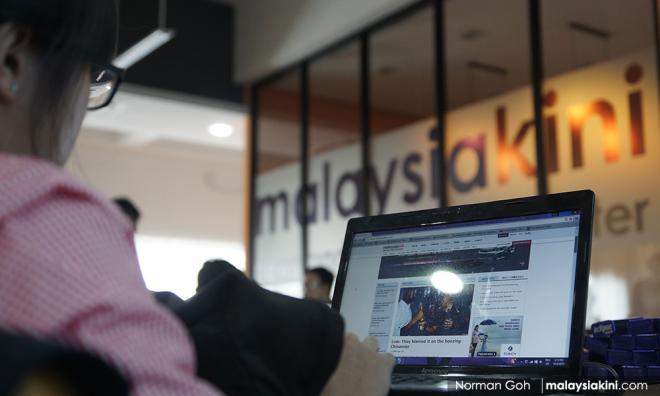
CSOs Article 19 and Civicus has urged Attorney-General Idrus Harun to drop the contempt proceedings against Malaysiakini and editor-in-chief Steven Gan and for the police to end their investigation into the matter.
“Article 19 and Civicus are concerned about contempt proceedings and a criminal investigation against online news media outlet Malaysiakini based on comments by readers on the Malaysiakini website.
“These actions are the latest in a series of attacks on press freedom in Malaysia by the Perikatan Nasional (PN) government.
“These proceedings set a dangerous precedent by making website owners and administrators criminally liable for the actions of Internet users over whom they have no control,” they said in a statement today.
They urged the government to reform laws, including the Communications and Multimedia Act 1998, the Evidence Act 1950 and the Penal Code to comply with international human rights standards.
They said targeting Malaysiakini, which was known for its “impactful reporting on human rights issues” will have a chilling effect on the entire media sector and other independent voices in Malaysia.
They said the Communications and Multimedia Act has frequently been used to investigate and prosecute government critics and block access to websites.
“Existing laws criminalise speech that is protected by international human rights law and impose liability on Internet intermediaries for third-party content that is published on their websites or platforms,” they said.
They pointed specifically to the Section 211 of the Communications and Multimedia Act which states that “no content applications service provider, or other person using a content applications service, shall provide content which is indecent, obscene, false, menacing or offensive in character with intent to annoy, abuse, threaten or harass any person”.

“The provision poorly defines the liability of online intermediaries, opening the door to imposing liability on websites for user-generated content.
“Section 233 on the ‘improper use of network facilities or network service’ contains similar language prohibiting offensive content and imposing criminal liability on anyone who ‘permits a network service or application to be used’ to disseminate such content,” the CSOs said.
They said Section 114A of the Evidence Act 1950, which was invoked to demonstrate Malaysiakini’s responsibility for user-generated content on its website, was introduced despite vocal concerns from civil societies.
This action by the attorney-general was inconsistent with international human rights standards as well as Article 10(1)(a) of the Federal Constitution which protects the right to freedom of expression, they said.
They pointed out that Article 19 of the Universal Declaration of Human Rights (UDHR) guarantees the right to freedom of expression in broad terms to encompass “freedom to hold opinions without interference and to seek, receive and impart information and ideas through any media and regardless of frontiers”.
Article 19 of the International Covenant on Civil and Political Rights (ICCPR), meanwhile, elaborates upon and gives legal force to the right to freedom of expression.
“Although Malaysia is not a party to the ICCPR, there is strong consensus that Article 19’s protection of the right to freedom of expression is incorporated into customary international law,” they said.
The UN Human Rights Committee had also said that while contempt of court proceedings may be justified in line with a government’s interest in maintaining public order, such proceedings must comply with the requirements of lawfulness, necessity and proportionality and “must be shown to be warranted in the exercise of a court’s power to maintain orderly proceedings,” the NGOs said.
As such, they reiterated that the contempt proceedings and criminal investigation against Malaysiakini violated the right to freedom of expression.
“The PN government must halt its attack on independent news sites and journalists and should instead focus on building public trust through an open and transparent approach to governance,” they said.
In a separate statement, the Centre for Independent Journalism (CIJ) along with 39 other civil society organisations (CSO) strongly condemned the continued use of “repressive” laws as tools of suppression by the PN government to silence dissent and opposing views.
Since the PN government came to power, the authorities have increasingly used laws such as the Communications and Multimedia Act, the Sedition Act 1948, the Peaceful Assembly Act 2012 and Section 504 and 505 of the Penal Code to silence freedom of expression, speech and assembly, they said.
“We find such attempts to be similar to strategic lawsuits against public participation tactics where legal action is brought against human rights defenders with the intention to censor, intimidate and silence critics until they abandon their criticisms.

“This is an especially dangerous form of retaliation from the government because of its potential to create a wider chilling effect on the media, civil society and activists, but disguised as a legitimate lawsuit,” they said.
There have been documented cases where members of the media, human rights defenders, activists as well as opposition political members were brought in for questioning and/or charged and arrested for exercising their right to expression by raising critical questions or participating in peaceful assemblies, they said.
There were also other individuals who were investigated and charged under these laws since the PN government came into power four months ago, they added.
“Read together, it can be seen as a deliberate and concerted series of actions intended to silence dissent and difference in opinions,” they said.
Freedom of speech, expression, assembly and association underpinned the fundamental right to seek, to receive and exchange ideas, opinions and information that would enable the public to form their own opinions and allow for dissenting or alternative positions, they said.
“They are critical in the functioning of a working and healthy democracy which includes strengthening the rule of law, combating corruption in all spheres of society and promoting good governance,” they said.
They said people have been targeted for raising critical questions or for raising visibility on potential human rights violations and abuse, which are “grossly disproportionate” to any legitimate aim of protecting public order.
“Any government that is too quick to put the weight of the state apparatus against dissenting voices and opinions is one that raises alarm bells for a functioning democratic system.
“Critical voices are at the heart of transparency and accountability to check and balance state power,” they said.
They also said that preventing misinformation and disinformation was not a reason to restrict access to information and cannot justify the use of laws to silence critics.
The government, they said, cannot be exempted from the consequences of their actions.
“Heads of state and public officials should tolerate more, not less, criticism than ordinary citizens,” they said.
As such, they urged the government to end the continued use of these “intimidating measures” to threaten and silence dissent and criticism and withdraw all charges against human rights defenders, the media and opposition members who were being investigated under the mentioned laws.
They also wanted the government to enact a right to information law and repeal or amend laws such as the Printing Presses and Publications Act (PPPA), the Official Secrets Act (OSA) and the Sedition Act, among others.
Lastly, they asked the government to create an environment that promoted critical thinking, healthy debates, transparency and accountability from the government as well as measures focused on building the people’s trust in the government. - Mkini


No comments:
Post a Comment
Note: Only a member of this blog may post a comment.